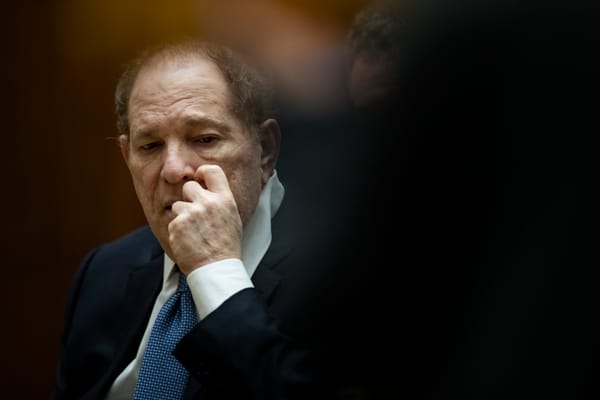‘He’s no Harvey Weinstein,” a friend said to me in 2021. Was he talking about the defrocked editor, the disgraced professor, the hot young writer who suddenly disappeared? I don’t recall. But even as it became permissible to voice doubts about #MeToo, some certainties remained. It was assumed by almost everyone that Harvey Weinstein had not only committed crimes, but had received a fair hearing and a just punishment.
It is now harder to sustain that assumption. On Thursday, the New York Court of Appeals overturned Weinstein’s conviction, citing lack of due process. The court’s decision focused on the prosecution’s extensive use of testimony from witnesses who accused Weinstein of committing crimes or other bad acts with which he hadn’t been charged. The court warned that the use of such evidence could result in “a guilty verdict based on supposition rather than proof.”
The appeals court also pointed to the trial judge’s decision to allow the prosecution to ask Weinstein about a broad range of alleged bad behavior if he took the witness stand. Prosecutors could have asked Weinstein about claims that he had thrown food at a colleague, punched his brother during a business meeting, turned over a table, and instructed his staff to photoshop the head of an actress onto another woman’s naked body for a movie poster. As the appeals court noted, most of these acts, however discrediting, “were not criminal in nature.” All of this risked “prejudicing the jury against the defendant,” encouraging it to convict Weinstein because of his perceived defects of character, not his proven culpability for the acts in question.
This decision is a vindication for journalists who questioned whether Weinstein had received due process. JoAnn Wypijewski deserves particular credit for her article in The Nation, “Why Harvey Weinstein Might Walk.” So do Phelim McAleer and Ann McElhinney for their podcast, “The Harvey Weinstein Trial: Unfiltered.” I also wrote on “The Meaning of Harvey Weinstein” for The American Conservative. I am grateful to the magazine and its editor, Helen Andrews, for supporting an essay that some others considered perverse.
The overturning of Weinstein’s conviction is an occasion to assess the #MeToo movement’s legacy. #MeToo began with accusations against the producer, and She Said (2022), Hollywood’s earnest dramatization of the movement, celebrates his downfall. What distinguished the movement was a belief that certain seemingly benevolent things—journalistic ethics, due process of law—stood in the way of true justice. Ronan Farrow’s reporting helped kick off #MeToo, but some of his most explosive allegations lacked corroboration, as Ben Smith noted in a report for The New York Times. Likewise, the Weinstein trial sought to achieve what was assumed to be a just outcome by neglecting due process and endangering the presumption of innocence.
Doubts about the Weinstein verdict have been present among members of the New York legal community for some time. The fact that they have now been acted upon makes clear that the moral passions behind #MeToo have faded, allowing more sober judgment to prevail. In this way, the verdict can be taken as another sign that “wokeness has peaked.”
“Moral passions are one thing, and institutional power is another.”
But moral passions are one thing, and institutional power is another. The week before the Weinstein verdict, the Biden administration announced the finalization of new Title IX regulations that, among other things, will again roll back due process for students accused of campus sexual assault, after it was restored under the Trump administration. As Emily Yoffe has noted, the Biden administration’s regulations allow a single administrator to serve as “detective, prosecutor, judge, and jury on a Title IX complaint.”
The broader culture may be moving on from various woke pieties, but the apparatus of the Democratic Party isn’t. This apparatus will persist even if the Democrats lose the presidency. It is entrenched in law schools, which are training lawyers in legal perspectives that disparage due process as an impediment to the righting of historical wrongs. It is expressed through non-governmental organizations that exert immense influence on the interpretation of administrative rules, as Leor Sapir has documented. So long as the institutions implementing it remain operative, wokeness is here to stay.
